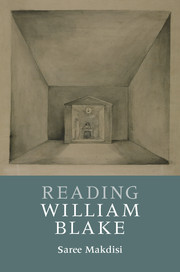3 - Desire
Published online by Cambridge University Press: 05 May 2015
Summary
I want to begin this chapter by going back to the discussion in the previous chapter of the “joys and desires” we see being bound by the priests in black gowns walking their rounds in “The Garden of Love.” It has become commonplace to view the invocation of joy and desire both here and elsewhere in Blake's work as a reference to the attributes of an individual self, and even, perhaps, as an expression of selfishness. It's true, of course, that in this case the poem itself seems to invite precisely such an interpretation, since, at least at face value, the lines are indeed spoken by a narrator expressing his joys and desires (or rather expressing his fear of their restriction by others). But we need to be careful because both joy and desire consistently appear throughout Blake's work – where they are among the most frequently used terms – in connection to collective rather than merely individual experiences, suggesting that selfishness is not exactly what is at stake in them.
Moreover, even in Songs of Innocence, let alone the more complex later works such as The Book of Urizen or The Four Zoas, no reference to the individual self offers as stable a point of reference as might seem to be the case. This is an especially tricky point for those of us who read Blake's work from the standpoint of a culture and society steeped in discourses of selfish, competitive individualism. It's all too easy for us to take individual selfhood for granted as a point of departure for reading. It's also easy for us to lose sight of the history of the very notion of possessive individualism, and in particular its emergence and formation in precisely the same seventeenth-century moment that also gave rise to many other ways of imagining our being in rather more open and expansive terms – including, as we shall see, ones that were far more interesting to Blake than mere individuality.
- Type
- Chapter
- Information
- Reading William Blake , pp. 50 - 67Publisher: Cambridge University PressPrint publication year: 2015



